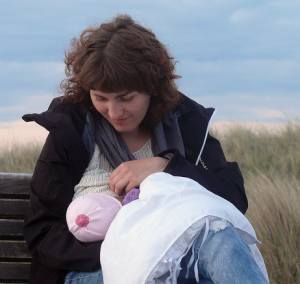Longer durations of exclusive breastfeeding strongly associated with fewer conduct disorders at ages 7 to 11 years, a new study has revealed.
 Just six months of breastfeeding can make your children brighter and well-behaved, according to a recent study.
Just six months of breastfeeding can make your children brighter and well-behaved, according to a recent study.
The pair of new studies further strengthens scientific understanding of the links between what a child experiences in the first years of life and later childhood behaviour and abilities.
In the first study, published in PLOS Medicine, an international team led by Dr Ruth M Bland of the University of Glasgow assessed over 1,500 children in South Africa, 900 of whom had been involved in an early infant feeding study.
They found longer durations of exclusive breastfeeding strongly associated with fewer conduct disorders at ages 7 to 11 years.
Children exclusively breastfed for the recommended six months, compared with those exclusively breastfed for less than one month, were approximately half (56 per cent) as likely to have conduct disorders at primary school age.
The study also found that children who attended creche for at least one year were 74 percent more likely to have higher executive function (which enables us to plan, focus attention, remember instructions, and juggle multiple tasks successfully. The brain needs this skill set to filter distractions, prioritise tasks, set and achieve goals, and control impulses. Executive function, therefore, influences educational and social success.)
Children stimulated at home, such as through play, were one third (36 per cent) more likely to have higher executive function scores.
There was weaker evidence that, for boys, exclusive breastfeeding for more than one month improved cognitive development.
The study also examined a number of current life factors that might influence children's development, finding that children were two-and-a-half times more likely to exhibit emotional-behavioural problems if their mothers had a current mental health problem or severe parenting stress.
The second paper, published by The Lancet Global Health and led by Dr Aisha K Yousafzai of the Aga Khan University followed up a cohort of impoverished children in rural Pakistan whose parents had been guided on strengthening nutritional care and "responsive stimulation" used to the end of age two.
In the responsive stimulation intervention, caregivers were coached to observe and respond to their child's cues during play and communication activities, improving the quality of interactions.
The intervention, adapted from the UNICEF and the World Health Organization's 'Care for Child Development' approach (which is readily available online), included using everyday household items or homemade toys to stimulate children's cognitive, language, motor and affective (emotional/feeling) skills.
At age four, children who received the responsive stimulation intervention were, to varying degrees, more likely to have higher IQ; better pre-academic skills (in sizes and comparisons, and shapes); better executive functioning; and more pro-social behaviour.
The follow-up study also found parents were better caregivers.
The research involved 1,302 four-year-olds and their mothers from the original study, which had likewise shown that responsive stimulation "significantly benefitted children's cognitive, language and motor development at two years."
The investigators intend to follow this cohort throughout their schooling.
Lead image used for representational purposes only. Image: Chris Alban Hansen/Creative Commons











 © 2025
© 2025